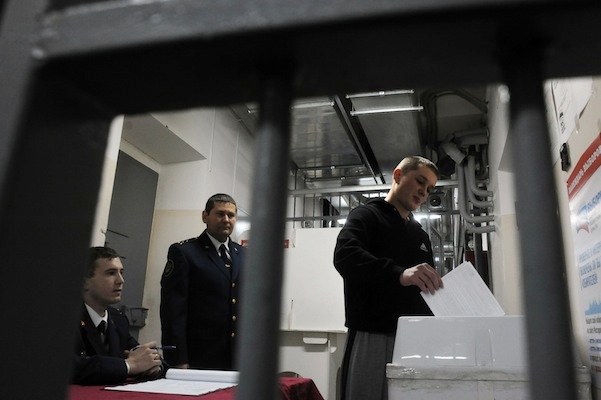I mean, honestly. What kind of mimsy, soggy-spined, weak-kneed, faffing, lentil-eating, self-loathing, lefty north London ninny gives a damn that prisoners don’t have the vote? Pretty much my entire social circle could be described in such terms (as mimsy ninnies and suchlike, not as prisoners) and nobody gives a flying monkey’s. I had a conversation about it with Jeremy Hardy on the News Quiz, for God’s sake, and even he was a bit ‘meh’. So how has this become an issue? What madness has taken root?
Of all the things you can do when you aren’t in prison that you can’t do when you are, you’d think voting would come pretty low down. Freedom to change the TV channel, walks in the sunshine, the laughter of a child, the feel of the wind on your face, a pint in a pub, the chance of a sexual experience that isn’t with a 19-stone armed robber who wants to put you in a wig; all of these things I would miss. But the vote? Come off it. For most of my life, I’ve lived in safe Labour seats. I basically don’t have a vote anyway.
If prisoners could vote, an early problem is that of where they’d vote. Physically, obviously, they’d do it from their prisons. But for which constituencies? If it was for their home constituency, then they’d be electing a representative for a place in which they no longer lived, which is odd. Plus, you’d expect that high proportions of crime come from the same constituencies, so theirs could be a deciding vote. Would prospective MPs have to tour prisons seeking constituents? Lunacy. But, then again, if prisoners voted in the constituencies their prisons were in, then those constituencies would be prison-dominated. Which might be a bit annoying for all the people who actually, you know, use the buses and stuff.
Of course, none of this is really about logic, but about the opposite of logic, which is Europe. It was the European Court of Human Rights which decided, last yearish, that Britain’s blanket ban on prisoners having the vote was illegal. Now, the easy way to solve this problem would be for the government to just go, ‘oh well, fine’, and turn the blanket ban into less of a blanket ban. You know, give it to prisoners who were about to get out, or who were only serving short sentences, relaxed in the knowledge that most of them probably wouldn’t bother voting anyway. They’ve been able to in Ireland since 2006, after all, and at the last election only 4 per cent of prisoners even bothered to register.
But Ireland is altogether less chippy and angry about that which the organs of Europe can and cannot be in charge of. For Conservatives in particular, regardless of the way that they would probably benefit from the votes of the handful of jailbirds who would bother, the very idea of anything European saying Britain has to do something Britain doesn’t want to is an affront. Me, I’m a bit equivocal. The ECHR isn’t the EU, after all, and shouldn’t be confused with it. It’s a supranational court, and supranational courts are theoretically a great way of placing a check on governments which are dodgy, bigoted, mental and awful.
The trouble is, our government isn’t dodgy, bigoted, mental and awful. It has just come to a different view on the theoretical rights of people with arrows on their pyjamas. Because of this, I keep thinking that when this fight is portrayed as a spat over sovereignty, people are badly missing the point. The trouble isn’t that we’re subject to the ECHR, it’s that the ECHR is behaving oafishly.
Sure, some people think prisoners should have the vote, but some don’t — it doesn’t take a great deal of empathy to realise that this is a subject on which sensible, compassionate people can have differing views. So what is a supranational court doing issuing a ruling on this at all? It’s as though these people are determined to undermine their own rationale by soaring beyond their remit. Seriously. Butt out.
I know you’re bored with Leveson. I’m bored with Leveson, we’re all bored with Leveson. Imagine how bored poor Leveson must be with Leveson. But there’s a point about the ongoing spat about regulation having a statutory component which has not been made, and needs to be. And it’s that, pretty much whatever happens, newspapers will be fine.
That doesn’t undermine the case of those against. In fact, it strengthens it. This is something the public needs to grasp. The near–uniform opposition to statutory regulation from Britain’s newspaper industry is not based on self-interest. For the industry, it really doesn’t make much difference whether there is a new law here or not. Whether a new regulator is statutory or contractual, the same practices will be allowed or not allowed, the same arbitration systems will work or, more likely, not work.
This is all about principle. The state should not be in control of the press. Nor should the state be in control of something else that controls the press. Nor should it be in control of something else that is in control of something else that is in control of the press. However far back you want to go, the state should not be there at the end.
Right now, it isn’t. If ever it was, most likely the press would be unchanged. But the state wouldn’t be. Get it?







Comments